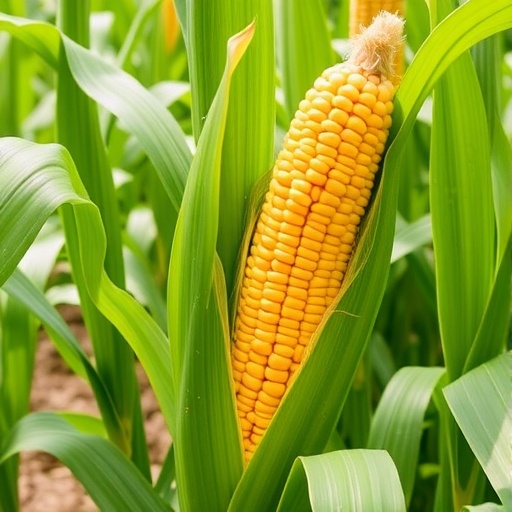
The intricate world of maize genetics is witnessing a revolutionary breakthrough as researchers delve into the genetic diversity of extra-early orange maize, known scientifically as Zea mays L. This study, spearheaded by a team of noted scientists, including Bonkoungou, Adejumobi, and Adetimirin, aims to unravel the complexities of genetic variation in this vital crop, offering promising insights for agriculture and food security.
The focus of the research is set against the backdrop of a global agricultural landscape that is increasingly challenged by climate change and the pressing need for sustainable food sources. Extra-early orange maize stands out not only for its nutritional benefits, being rich in pro-vitamin A carotenoids, but also for its potential to thrive in a variety of environments. Understanding its genetic diversity is a key step to enhancing its cultivation and food production efficiency.
The researchers utilized a dual approach, integrating both phenotypic and molecular data to conduct their analysis. This comprehensive method enables a deeper understanding of the traits and genetic markers associated with different maize varieties. The phenotypic data pertains to observable characteristics such as plant height, ear length, and kernel color, while the molecular data involves the genetic sequencing and analysis of DNA markers. By combining these two spheres of research, the study aims to build a more robust and conclusive picture of genetic diversity in extra-early orange maize.
The analysis revealed significant insights into variations among different maize populations. The genetic markers identified through sequencing provide a point of reference for breeders looking to create more resilient strains of maize that can adapt to changing climatic conditions. Notably, the team’s findings indicate potential pathways for selecting cultivars that not only resist environmental stresses but also enhance yield and nutritional content.
Furthermore, the implications of this research extend beyond mere genetic assessment. For farmers, the knowledge gleaned from this study means they can make informed decisions about which maize varieties to cultivate based on their specific environmental conditions. This tailored approach can lead to increased productivity and sustainability in maize farming practices, which in turn supports food security—especially in regions highly dependent on maize as a staple crop.
In addition, the findings contribute to the broader field of genomics and plant breeding. The use of molecular markers facilitates the identification of desirable traits in breeding programs, expediting the development of new varieties that meet emergent agricultural challenges. This aspect of the research underscores the critical role of genetic research in achieving sustainable agriculture and improving crop resilience in the face of global challenges.
The study emphasizes the importance of collaboration among scientists in various fields, including genetics, agronomy, and nutrition. Such interdisciplinary efforts pave the way for comprehensive studies that address complex agricultural issues from multiple angles. By working together, researchers can foster innovations that may ultimately revolutionize crop production and food distribution globally.
As the research team continues to analyze the genetic data, they remain hopeful about the future applications of their findings. The quest for developing superior maize cultivars, particularly in regions susceptible to climate distress, remains a priority. Advances in genetic research, such as those presented in this study, hold the promise of revolutionizing how we approach crop resilience and selection in the coming years.
The study not only highlights the potential of enhanced varieties of maize but also serves as a reminder of the significance of genetic diversity in agricultural ecosystems. A stable genetic foundation is crucial for the adaptability and survived of crops in fluctuating climates. Therefore, understanding the genetic framework of vital crops like maize should be a priority for both scientists and policy makers.
This research opens the door to future studies that could explore the genetic basis of other important traits in maize and related crops. The pursuit of knowledge in this area is ongoing, with the hope that continuous advancements in technology will further illuminate the intricate relationship between genetics and crop performance.
Additionally, the collaboration with local farmers could further enhance the application of these findings. Engaging with those who work directly with maize cultivation ensures that research remains grounded in practical realities, ultimately leading to innovations that benefit communities at the grassroots level.
In conclusion, the joint analysis of phenotypic and molecular data for genetic diversity assessment in extra-early orange maize stands as a beacon of hope for the future of agriculture. By understanding and utilizing the genetic diversity present within maize populations, the scientific community can rise to meet the ever-growing challenge of food production in an unpredictable world. The journey ahead is filled with potential, as researchers strive to equip farmers and breeders with the tools necessary to thrive in a rapidly changing agricultural landscape.
In this endeavor, knowledge is a shared resource that has the power to change lives, improve health, and support sustainable practices that benefit the planet as a whole. Collaborative research efforts like this underscore the importance of working together for a common goal: a future where food security is a reality for all.
Subject of Research:
Genetic diversity assessment in extra-early orange maize (Zea Mays L.)
Article Title:
Joint analysis of phenotypic and molecular data for genetic diversity assessment in extra-early orange maize (Zea Mays L.)
Article References:
Bonkoungou, T.O., Adejumobi, I.I., Adetimirin, V.O. et al. Joint analysis of phenotypic and molecular data for genetic diversity assessment in extra-early orange maize (Zea Mays L.). BMC Genomics 26, 784 (2025). https://doi.org/10.1186/s12864-025-11964-5
Image Credits: AI Generated
DOI:
Keywords: Genetic Diversity, Extra-Early Maize, Phenotypic Data, Molecular Data, Zea Mays, Sustainable Agriculture, Food Security, Crop Resilience, Climate Change
Tags: agricultural challenges and innovationsclimate change and food securityenhancing maize cultivation efficiencyextra-early maize researchgenetic diversity of orange maizemaize genetics and breeding strategiesmaize traits and genetic markersnutritional benefits of orange maizephenotypic and molecular data analysispro-vitamin A carotenoids in maizesustainable agriculture solutionsZea mays L genetic variation




